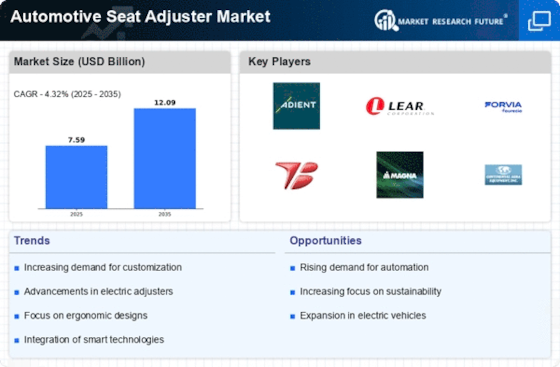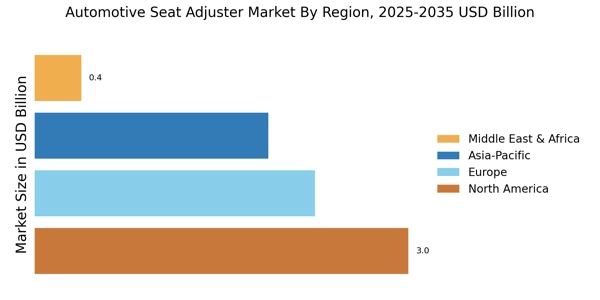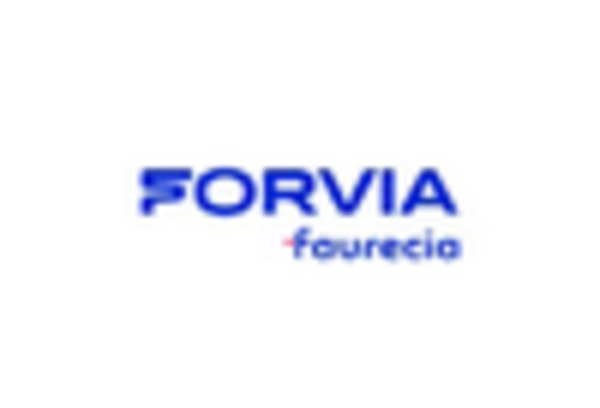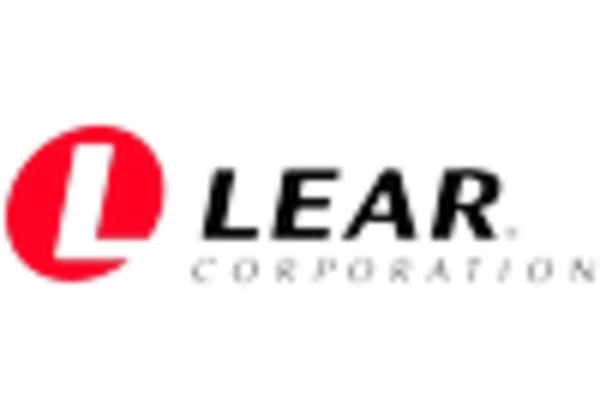Growing Electric Vehicle Adoption
The shift towards electric vehicles (EVs) is significantly impacting the Automotive Seat Adjuster Market. As EV manufacturers strive to create more spacious and comfortable interiors, the demand for innovative seat adjusters that maximize space and functionality is on the rise. Electric vehicles often feature unique design elements that necessitate advanced seat adjuster technologies, such as lightweight materials and compact mechanisms. Market analysis reveals that the EV segment is expected to grow at a staggering rate of 15% annually, which will likely drive the demand for specialized seat adjusters tailored to the needs of electric vehicle interiors.
Integration of Smart Technologies
The integration of smart technologies into the Automotive Seat Adjuster Market is transforming the way consumers interact with their vehicles. Features such as automatic seat adjustments based on driver preferences, memory settings, and even biometric sensors that adapt to the user's body shape are becoming increasingly prevalent. This technological evolution not only enhances user experience but also aligns with the growing trend of vehicle automation. Market data suggests that the smart seat adjuster segment is expected to witness a growth rate of approximately 8% annually, driven by advancements in artificial intelligence and machine learning, which are likely to redefine comfort and convenience in automotive seating.
Increased Focus on Safety Features
Safety remains a critical concern in the Automotive Seat Adjuster Market, with manufacturers prioritizing the development of seat adjusters that enhance occupant protection. Innovations such as adjustable headrests, side bolsters, and integrated safety belts are being designed to work in conjunction with seat adjusters to minimize injury during collisions. Regulatory bodies are increasingly mandating safety standards that require advanced seat adjuster functionalities, thereby driving market growth. Recent statistics indicate that vehicles equipped with advanced safety features, including enhanced seat adjusters, have a 30% lower risk of injury in accidents, underscoring the importance of safety in automotive design.
Rising Demand for Comfort and Ergonomics
The Automotive Seat Adjuster Market is experiencing a notable increase in demand for comfort and ergonomic seating solutions. As consumers become more aware of the health implications associated with prolonged driving, the need for adjustable seating that promotes better posture and reduces fatigue is paramount. This trend is particularly evident in the luxury vehicle segment, where manufacturers are integrating advanced seat adjusters that offer multiple adjustments, including lumbar support and memory functions. According to recent data, the ergonomic seat segment is projected to grow at a compound annual growth rate of 6.5% over the next five years, indicating a robust market potential for innovative seat adjuster technologies.
Customization Trends in Automotive Design
Customization is becoming a prominent trend within the Automotive Seat Adjuster Market, as consumers increasingly seek personalized driving experiences. Manufacturers are responding by offering a variety of seat adjuster options that allow for tailored adjustments based on individual preferences. This includes features such as adjustable seat depth, height, and angle, which cater to diverse body types and driving styles. Market Research Future indicates that the customization segment is projected to grow by 7% over the next few years, reflecting a shift towards more personalized automotive solutions that enhance comfort and user satisfaction.

















